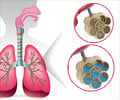Q: Which doctor should I consult for drug-induced pulmonary diseases?
A: A general practitioner (GP) or a family physician must be first consulted, with the symptoms. The GP may then refer you to a pulmonologist for expert advice and treatment.
Q: What are the drug-induced pulmonary effects of consuming ACE inhibitors?
A: ACE inhibitors, commonly used blood pressure medications like enalapril, ramipril and lisinopril cause dry cough in almost 15% of patients consuming the medications.
Q: What is drug-induced pulmonary fibrosis?
A: Pulmonary fibrosis means collection of excessive connective tissue in lungs resulting in scarring of the lungs. Drugs like cyclophosphamide, penicillamine, nitrofurantoin or excessive exposure to silica, asbestos or bacterial infections have been associated with lung fibrosis. The typical symptoms include breathlessness, non-productive cough and fever.
Q: What could be the complications associated with drug-induced pulmonary disease?
A: Milder forms of lung disease caused by drugs like pneumonitis can progress to hypoxemia (low blood oxygen levels), lung fibrosis or respiratory failure.
Q: What is the prognosis or outcome in patients with drug-induced pulmonary disease?
A: Patients with mild reactions usually heal completely following withdrawal of the drug. Patients with serious reactions require additional treatment.










